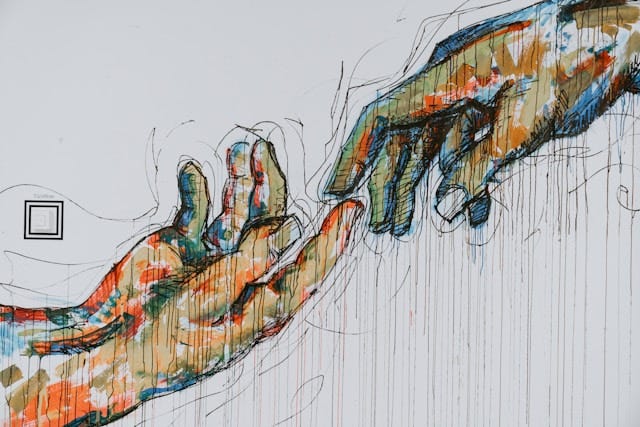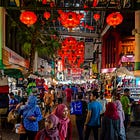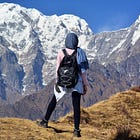My first memory of “othering” was when I was about seven years old. One afternoon, a girl who lived across the road diagonally from me called me from outside my gate, “Do you want to play badminton?” She must have seen me watching her play the day before. I delightedly accepted her invitation.
We batted the shuttlecock across my gate, using it as a makeshift net and also because I was not allowed to leave my house compound. But that did not matter, we made it work and we had a lot of fun; it might even be the first time I played badminton.
Later that evening, my mother came to me with a reprimanding gaze. An elderly neighbor from across the road had told her that I was playing with the Indian girl. My mother said I wasn’t to play with her again.
I remember asking her why, finding it totally unjustified. But she didn’t relent nor give me a satisfactory answer. I didn’t know what it meant then, but I felt it deeply—the sharp sting of being told to build a divide where I hadn’t seen one before.
She was “the other,” my mother seemed to say. I wasn’t meant to question it—I was simply forbidden to bridge the divide.
Was it because she had a different skin color than me? Because she spoke another language, though we had managed well enough in Malay, the lingua franca of Malaysia? Was it because her family had a different culture or religion than mine, though I didn’t belong to any religion at that time?
Only many years later would I find out the possible reason. Listening in on the adults’ conversation, I heard that her father had been abusive to her mother. Perhaps my parents thought they were protecting me. But the damage was done, I have tasted the bitterness of othering.

Now, I see similar invisible gates rising in the world around me. As the world recently divided over a big event that shall not be named, I felt myself swept along in the rhetoric.
Why would anyone agree to that? How can anyone accept that? What are these people thinking? The disconnection between me and these seemingly “other people” caused a chasm so wide I couldn’t hear my echo even if I screamed.
And that is the problem. The communication became one-sided, with thoughts coming only from me and those on my side of the valley.
Like the bubble I grew up in, I was shielded from the reality that I, too, was “the other”—until something came along and burst it. A rude awakening it was, but also very much needed.
Sooner or later, we all must face the world to see its true colors—a kaleidoscope of people with cultures, languages, and beliefs as varied, if not more, than the spectrum of colors, blending in endless, beautiful ways. Yet we all come from the same essence—the light.
“If I can see the goodness, if I can see that light, if I can see whatever ways that it manifests, if I can feel my care, on some level I can imagine and expand that sense of the goodness and mirror back. Become a mirror of goodness whenever you can cause it force it out of people….trust in it, there is real power in it.” - Tara Brach in The Sacred Work of Bridging Divides.
Later in life, I backpacked my way across the chasms of divide, carrying my heart on my sleeve and striving to be a mirror of goodness myself. Along the way, I met many good people from all walks of life, returning my echo.
With every interaction, I was reminded of something that the little girl inside me had always known—we are all the same. We are made of the same light.
But returning to daily life, I couldn’t ignore how often the world insists otherwise. In this increasingly polarized age, we are reminded—over and over—how different “the others” are.
It happens when opinions clash, when perspectives diverge, and when ideologies seem irreconcilable. Sometimes, I paused while reading someone’s words, thinking, “That can’t be right. This person cannot be serious.”
But then, I remind myself to step back. I may not understand their perspective because I am not in their life or their circumstances. I have not lived their experiences, just as they have not lived mine.
We are all uniquely complex, which is why there are parts of us that do not intersect—but surely, there are parts that do. A moment of awe washes over me as I feel sonder acutely—that profound realization that everyone, all these strangers out there, has a life as intricate and vivid as my own, constantly unfolding beyond my awareness.
This is where we should allow ourselves to admit, as Socrates did around 2,400 years ago: “I know that I know nothing.” His timeless humility reminds us that certainty is not the same as wisdom.
What we are so certain of—our moral compass, our beliefs, our paradigm, and our school of thought—would actually thrive and grow if we strip them bare and subject them to self-examination from time to time.
“It is possible to have strong values and passionate commitments and still be open to self-doubt and self-examination. Art and literature used to thrive on confusion, awkwardness, bewilderment, and doubt—especially self-doubt.” - Elif Shafak, The Tyranny of Certainty in Uncertain Times.
That childhood badminton game taught me something I didn't understand until much later. There may be a gate that divides us, but if we are willing, we can still play.
Each serve and return was a dialogue between two children divided not just by a gate but also by culture, language, way of life, and the invisible barriers humans had built around them.
Perhaps connection isn’t about removing the gate or the divide, but about continuing to play despite it.
It is the trust that, with each stroke, we are bridging the chasm and bringing us closer to seeing the light that binds us all.
Please let me know:
Have you ever felt like ‘the other’ or, conversely, seen someone else as ‘the other’?





A good reminder how important it is to build connections with those around us ❤️
This is such a mature and wise essay, one that we all should hear from time to time to remind us of our shared humanity. xo